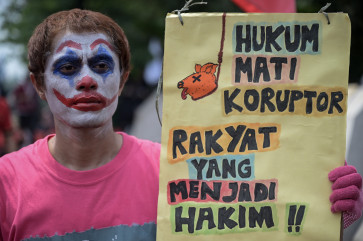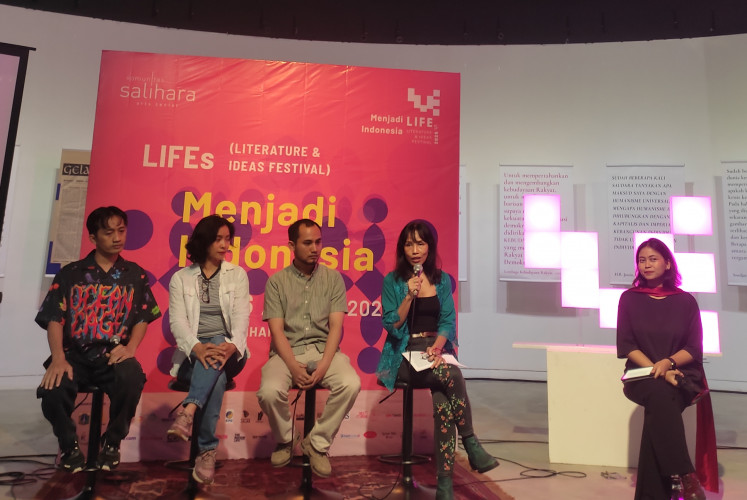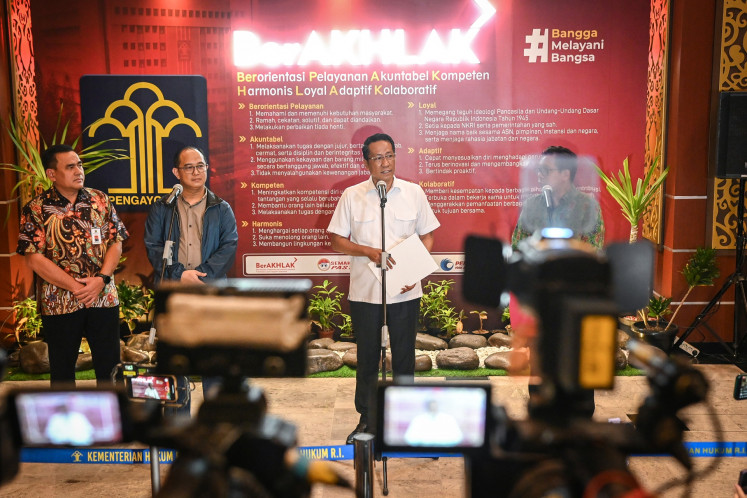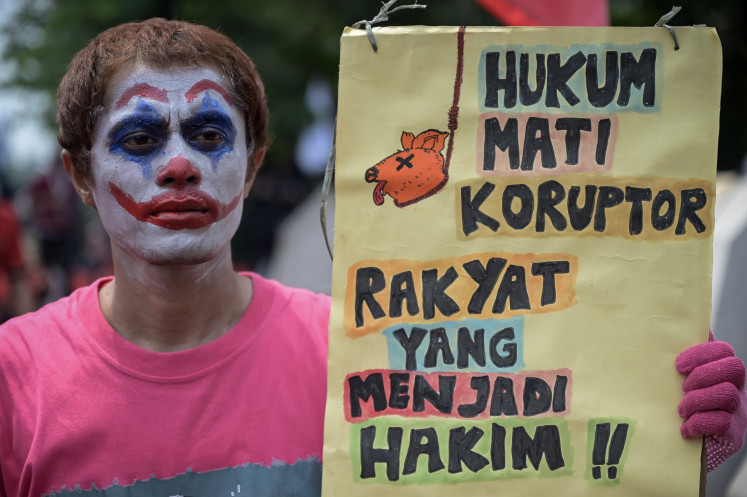Popular Reads
Top Results
Can't find what you're looking for?
View all search resultsPopular Reads
Top Results
Can't find what you're looking for?
View all search resultsFirst West African case of deadly Marburg virus detected: WHO
The virus, which is carried by bats and has a fatality rate of up to 88 percent, was found in samples taken from a patient who died on August 2 in southern Gueckedou prefecture, the WHO said.
Change text size
Gift Premium Articles
to Anyone
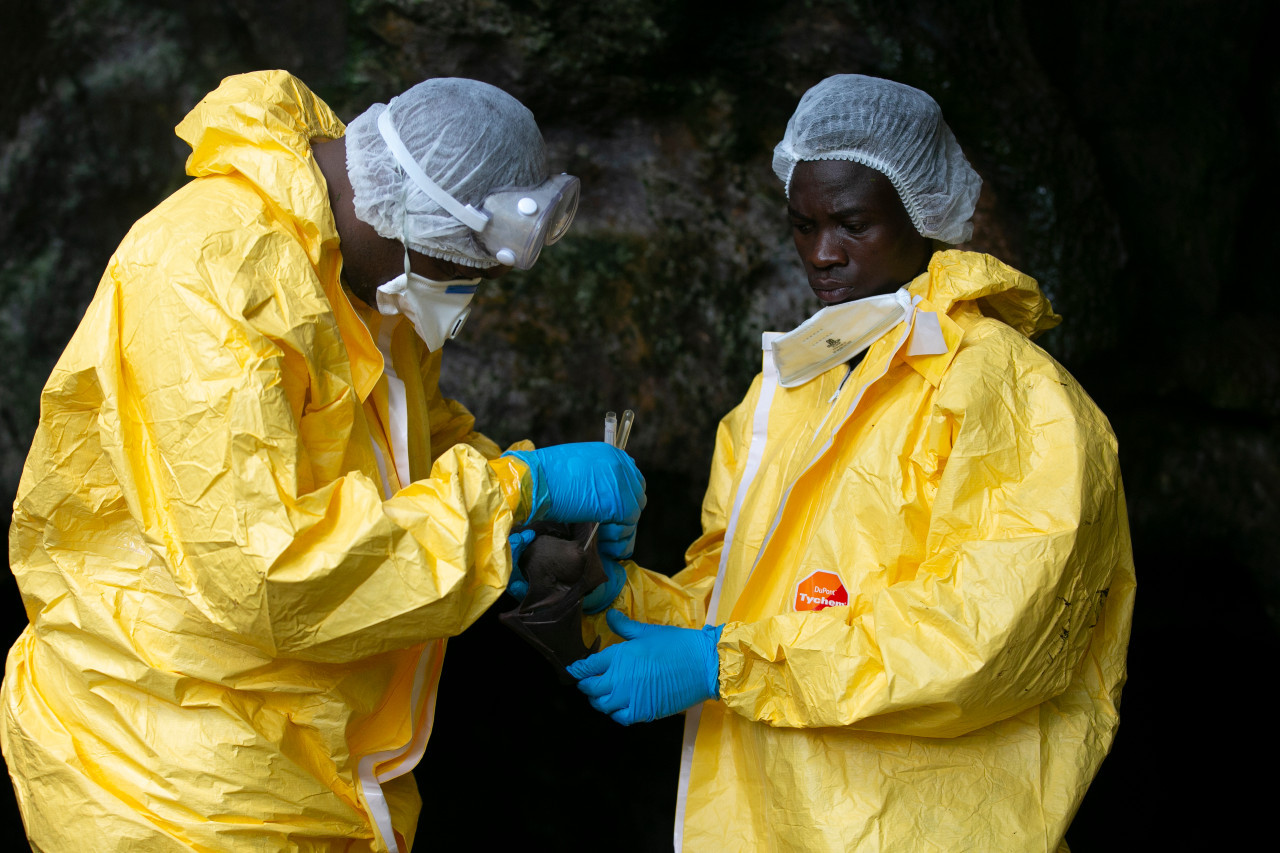 Researchers with Franceville interdisciplinary Medical Research Center (CIRMF, Centre Interdisciplinaire Medical de Recherches de Franceville) collect samples from a bat on Nov. 25, 2020 inside a cave in the Zadie region in Gabon. Working in remote recesses in the hearth of the Gabonese forest, scientists scour caves populated by bats, animals suspected of being at the origin of many epidemics transmitted to humans in recent years: the SARS in 2003, MERS in 2012, Ebola and now SARS-CoV-2 or COVID-19
(AFP/Steeve Jordan)
Researchers with Franceville interdisciplinary Medical Research Center (CIRMF, Centre Interdisciplinaire Medical de Recherches de Franceville) collect samples from a bat on Nov. 25, 2020 inside a cave in the Zadie region in Gabon. Working in remote recesses in the hearth of the Gabonese forest, scientists scour caves populated by bats, animals suspected of being at the origin of many epidemics transmitted to humans in recent years: the SARS in 2003, MERS in 2012, Ebola and now SARS-CoV-2 or COVID-19
(AFP/Steeve Jordan)
G
uinea confirmed a case of Marburg disease, the World Health Organization said on Monday, the first recorded in West Africa of the lethal virus that's related to Ebola and, like Covid-19, passed from animal hosts to humans.
The virus, which is carried by bats and has a fatality rate of up to 88 percent, was found in samples taken from a patient who died on August 2 in southern Gueckedou prefecture, the WHO said.
"The potential for the Marburg virus to spread far and wide means we need to stop it in its tracks," said Dr Matshidiso Moeti, WHO Regional Director for Africa.
The discovery comes just two months after the WHO declared an end to Guinea's second outbreak of Ebola, which started last year and claimed 12 lives.
In Geneva, the WHO said it considered the threat "high" at the national and regional level, but "low" globally.
"We are working with the health authorities to implement a swift response that builds on Guinea’s past experience and expertise in managing Ebola, which is transmitted in a similar way,” Moeti said.
The Guinean government confirmed the Marburg case in a statement.
Marburg virus is usually associated with exposure to caves or mines housing colonies of Rousettus bats. Once caught by a human, it is spread through contact with bodily fluids of infected people, or with contaminated surfaces and materials, according to the WHO.
Rapid response
“We applaud the alertness and the quick investigative action by Guinea’s health workers," Moeti said.
The case was detected in a village in a forested region close to the borders of Sierra Leone and Liberia.
The man's symptoms date back to July 25, the WHO said.
After being initially treated at a local clinic and tested for malaria, the patient died "in the community", the WHO said.
Post-mortem samples then tested negative for Ebola, but positive for Marburg.
Ten WHO experts, including epidemiologists and socio-anthropologists, are already in the field to support national health authorities.
The emergency response includes risk assessment, disease surveillance, community mobilisation and screening, clinical care, infection control and logistical support, WHO said.
Cross-border surveillance has also been stepped up so that possible cases can be quickly detected, it said.
Three family members of the deceased and a healthcare worker have been identified as high-risk close contacts and are being monitored, while investigations are under way to identify the source of the infection and any other possible contacts, the WHO said.
Previous outbreaks and sporadic cases have been reported in South Africa, Angola, Kenya, Uganda, and the Democratic Republic of the Congo.
But this is the first time the virus has been detected in West Africa.
The disease begins suddenly, with a high fever, severe headache and discomfort.
Fatality rates have ranged from 24 percent to 88 percent in previous outbreaks, depending on the virus strain and case management, the WHO says.
Although there are no approved vaccines or antiviral treatments, oral or intravenous rehydration and treatment of specific symptoms improve survival rates, it says.

